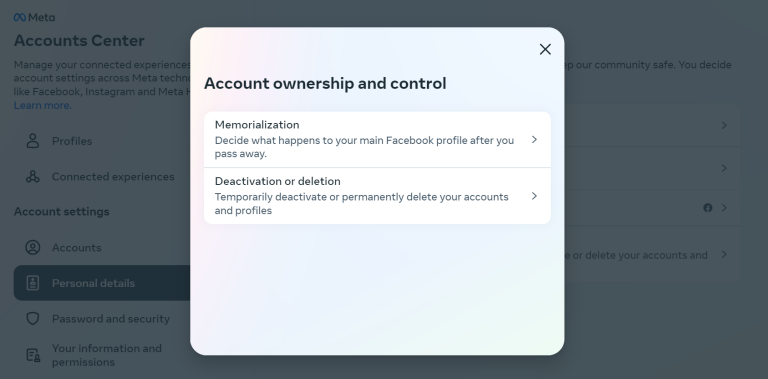How to protect your data when you die
The issue of privacy concerning all of us is: What happens to our online photos, location history, and data when we pass away?
Data privacy laws such as the GDPR and the right to be forgotten give citizens in certain countries the ability to erase their personal information from the internet if they choose to, and hold tech companies responsible if they fail to follow specific protections when handling it.
ad
Deleting your Facebook, Snapchat, or Instagram accounts is also an option while you’re alive. Usually, data is stored for a certain period before being wiped from servers completely.
However, laws regarding personal data after someone’s death are less clear. Since regulations have not kept pace with technology, your data is largely at the mercy of big tech companies. Nevertheless, there are a few steps you can take to address this issue.

Set up Inactive Account Manager for Gmail
ad
If you’re a Gmail user, you have the option to instruct Google to delete your data after a period of inactivity. Simply visit the inactive account page and initiate the process. During setup, you’ll need to provide an email address for notification after three months of inactivity. However, it’s important to note that this isn’t solely based on three months of not logging into your Gmail account. If you’re active on other Google services like Chrome browser or YouTube while logged in, Gmail will still consider you active.
Furthermore, the inactive account page enables you to designate a trusted individual to download and access your data across Google’s suite of products. Be prepared to provide identifying information such as their phone number during this process.

Choose a Legacy Account in Facebook
For Facebook users, there’s the choice to designate a legacy contact who serves as a legal guardian in the event of their passing. These contacts have permissions to alter profile and cover photos, download Facebook data, respond to friend requests, but they cannot access old messages. Additionally, they can request Facebook to delete the account.
Users also have the option to permanently delete their accounts upon their death. Facebook may memorialize accounts upon being informed of a user’s passing, indicated by the term “remembering” appearing next to their name.
Despite these functionalities, it’s estimated that Facebook could have approximately 4.9 billion deceased users by 2100.
Instagram offers a similar memorialization feature, though it’s unclear if it’s entirely separate from Facebook. Once activated, memorialization on Instagram restricts further updates and displays the term “remembering” alongside the person’s name.

Contact Twitter support
Twitter’s protocols for removing deceased accounts are somewhat more complex. Currently, users lack the ability to designate a legacy contact or establish procedures for inactive accounts.
Those associated with a deceased user can request Twitter support to delete the account, but they are required to furnish details about the deceased, along with copies of their identification and death certificate.
Initiating Twitter’s privacy form is the initial phase. However, once an account deletion is arranged, it is completely erased from Twitter’s servers. Unlike Facebook, there is no option for memorialization.
Update your will
A rising practice is to nominate a “digital executor” in your will. This might involve storing all your passwords in a password manager like LastPass or 1Password and providing the master password in your will. With this arrangement, your loved ones can access your accounts, safeguard certain photos and memories, and arrange for their deletion when appropriate.
FAQ’s
What happens to our online data after we pass away?
After your passing, your online photos, location history, and data may remain accessible unless specific actions are taken to address them.
How can data privacy laws like GDPR affect post-mortem data handling?
GDPR and similar laws allow individuals in certain regions to erase their personal information from the internet and hold tech companies accountable for mishandling data, even after death.
Is deleting social media accounts an option before death?
Yes, users can choose to delete Facebook, Snapchat, or Instagram accounts during their lifetime. Typically, data is retained for a period before being completely wiped from servers.
What options are available for managing online accounts after death?
Legacy contacts can be appointed for Facebook, enabling them to manage certain aspects of the account or request its deletion. Instagram also offers memorialization options.
How does Gmail’s Inactive Account Manager work?
Gmail users can set up the Inactive Account Manager to delete their data after a period of inactivity. Additionally, trusted individuals can be designated to access and manage the data.
What is Twitter’s protocol for handling deceased accounts?
Twitter users cannot designate a legacy contact, but those associated with a deceased user can request account deletion from Twitter support. Detailed information and documentation are required for this process.
Can online accounts be addressed in a will?
Yes, a “digital executor” can be appointed in a will to manage online accounts. This may involve storing passwords and instructions for account management.
What happens to online accounts if no action is taken before death?
Without proactive measures, online accounts may remain active or become inaccessible, leaving data vulnerable or causing complications for loved ones.
Are there estimated figures for the number of deceased users on social media platforms in the future?
Yes, it’s estimated that platforms like Facebook could have billions of deceased users by a certain year, highlighting the importance of post-mortem data management.
What steps can individuals take to ensure their online data is managed according to their wishes after death?
Updating wills, setting up account management tools, and informing trusted individuals about digital assets can help ensure proper handling of online data after death.
Conclusion
As our digital footprint grows, it’s crucial to address the fate of our online presence after death. While data privacy laws offer some protection, gaps remain in post-mortem data handling. Platforms like Facebook, Instagram, Gmail, and Twitter provide options for managing accounts after death, but proactive steps such as appointing a digital executor and updating wills are essential. By taking these measures, individuals can ensure their digital legacy is handled according to their wishes, providing peace of mind for themselves and their loved ones in the digital age.
ad


Comments are closed.